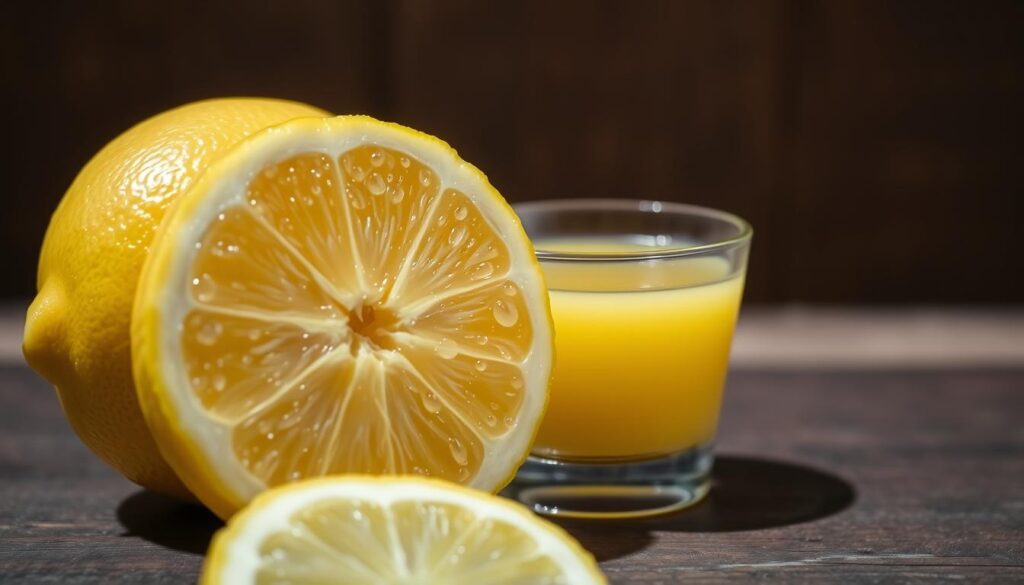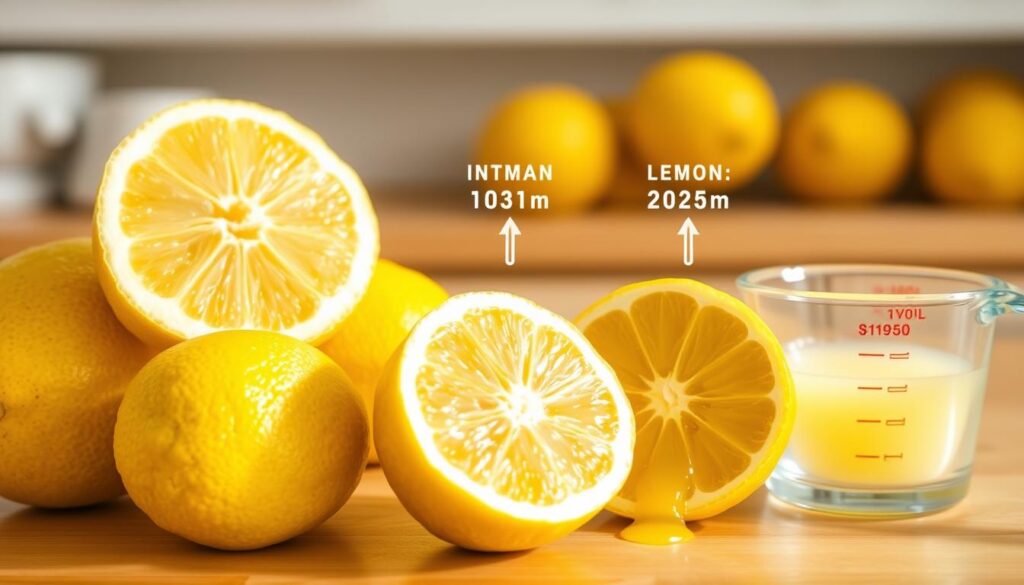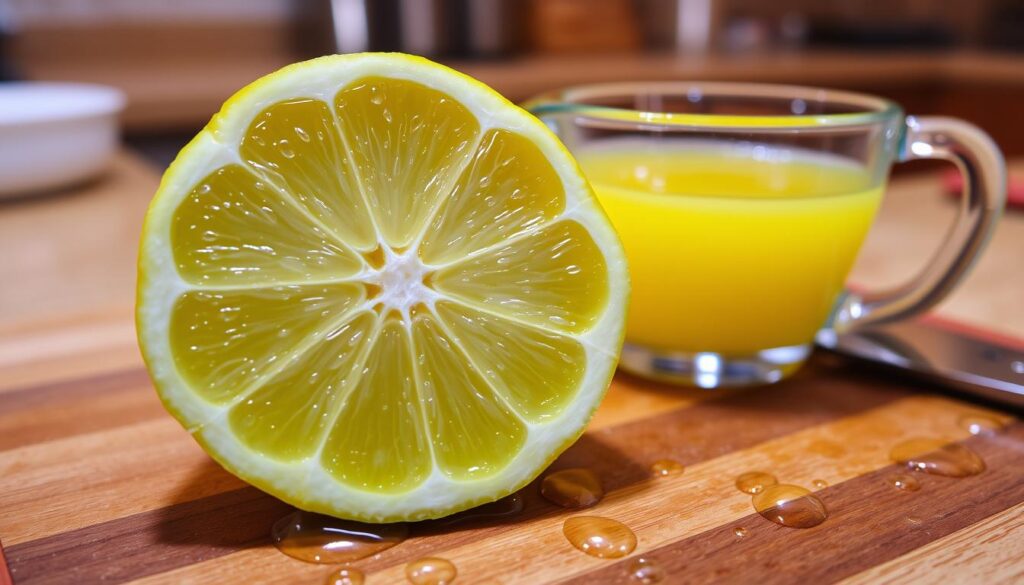Lemons are a versatile citrus fruit that adds a bright, tangy flavor to many dishes and drinks. They’re essential for making lemonade, zesting for baking, or adding a squeeze to salads. Knowing how much juice you can get from one lemon is very useful. This article will cover lemon juice production, the factors affecting the juice amount, and tips for getting the most juice.
Table of Contents
Key Takeaways
- The average lemon yields between 2-3 tablespoons of juice, which can vary depending on factors like the lemon variety and ripeness.
- Proper preparation techniques, such as using room-temperature lemons and rolling them before cutting, can help increase the juice yield.
- Certain tools and equipment, like handheld citrus juicers, can make the juice extraction process more efficient.
- Factors like lemon variety, size, and ripeness can all impact the total amount of juice a single lemon can provide.
- Proper storage techniques can help preserve the freshness and flavor of lemon juice for longer periods.
Lemon: The Versatile Citrus Fruit
Lemons are a citrus fruit loved for their tangy taste and health benefits. They add a zesty flavor to dishes and are packed with nutrients. Let’s examine what makes lemons special and how to use lemon juice daily.
The Nutritional Profile of Lemons
Lemons are full of vitamins and minerals. A medium lemon has:
- Vitamin C: Nearly 20% of the recommended daily intake supports immune function and collagen production.
- Vitamin B6: Approximately 2% of the daily requirement, aiding protein metabolism and red blood cell formation.
- Potassium: About 2% of the daily need, helping to regulate blood pressure and maintain healthy nerve and muscle function.
- Fiber: Around 2 grams, promoting digestive health and feelings of fullness.
Lemons are also full of antioxidants like flavonoids. These can help reduce inflammation and protect against chronic diseases.
Popular Uses of Lemon Juice
Lemon juice is very versatile. Here are some common ways to use it:
- Enhancing the flavor of beverages, such as water, tea, and cocktails
- Adding a tangy twist to marinades, dressings, and sauces
- Brightening up baked goods, including cakes, cookies, and pies
- Serving as a natural cleaning agent for household surfaces
- Providing a refreshing and hydrating boost to skincare routines
Lemon juice is great for adding flavor to meals, cleaning, and refreshing your home. It’s a true kitchen superstar.
Factors Affecting Lemon Juice Yield
The amount of juice a lemon produces can vary greatly. Knowing what affects this is key to getting the most juice from your lemons.
Size and type of lemon are big factors. Bigger lemons give more juice than smaller ones. Some lemons are naturally juicier than others. Also, if a lemon is fully ripe, it will give more juice than one that’s not ripe enough or too ripe.
How you squeeze the lemon also matters. You might use a manual or electric juicer or just squeeze it by hand. The lemon’s freshness and how you store it can also affect the amount of juice you get.
- Lemon size and variety
- Ripeness level
- Extraction method
- Freshness and storage conditions
Knowing these factors that affect lemon juice yield and variables that impact lemon juice amount helps you make the best use of your lemons.
“The key to unlocking the full potential of lemons lies in understanding the factors that influence their juice yield.”
How to Maximize Juice Extraction from a Lemon
You need the right preparation and tools to get the most juice from a lemon. Follow simple steps to get the best out of this citrus fruit.
Preparation Techniques
Before juicing, prepare the lemon well. Roll the lemon on a flat surface with your hand to break down the cell walls, which will produce more juice. Also, microwave the lemon for 10-15 seconds to soften it and help with juice extraction.
Tools and Equipment
The right tools are key for getting lemon juice out. Here are some top choices:
- Manual citrus juicer: This device presses the lemon using a reamer or cone, separating the juice from the pulp and seeds.
- Electric juicer: An electric juicer is fast and easy to use for making lots of juice. Choose one made for citrus fruits.
- Squeeze bottle: A squeeze bottle with a spout is handy for extracting juice from a lemon. It lets you control the flow.
Using the right prep methods and tools helps you get fresh, tasty lemon juice from each lemon.
“The secret to getting the most juice from a lemon is all in the preparation and the tools you use.”
Average Juice Content in One Lemon
Research shows that an average lemon yields 2 to 3 tablespoons of fresh juice. This is great news for home cooks, bartenders, and anyone wanting to add lemon flavor to their recipes and drinks.
The juice amount can change based on the lemon’s size, type, and ripeness. Bigger lemons usually have more juice than smaller ones. Some lemon types are naturally juicier than others. The ripeness of the lemon also affects how much juice you get, with ripe lemons giving more juice.
| Lemon Size | Average Juice Yield (Tablespoons) |
|---|---|
| Small | 1-2 |
| Medium | 2-3 |
| Large | 3-4 |
Keep in mind, these are just rough estimates. The actual juice you get from a lemon can vary. But, this guide can help when planning recipes or figuring out how much lemon juice you need.

“The average lemon can provide a surprising amount of fresh, zesty juice – perfect for adding a bright, tangy flavor to a wide range of culinary creations.”
How Much Juice in One Lemon: The Answer
Many people wonder how much juice is in a lemon. The answer changes based on a few things. On average, you can get about 2 to 3 tablespoons, or 30 to 45 milliliters, from one lemon.
This comes from looking at how different things affect the juice in lemons. These include the lemon type, how ripe it is, and how you squeeze it out. While every lemon is different, this gives you a good idea of what to expect.
Let’s talk about what affects the juice in a lemon:
- Lemon Variety: Different types of lemons have different amounts of juice.
- Ripeness Level: Riper lemons have more juice than those that are not ripe yet.
- Extraction Method: How you juice the lemon can change how much you get.
So, the average juice in one lemon is usually between 2 to 3 tablespoons. This is good to know for making recipes, mixing cocktails, and enjoying lemons in different ways.
Variations in Lemon Juice Yield
The amount of lemon juice you get can vary greatly. This depends on the lemon type and how ripe it is. These things are key to how much juice a lemon has.
Variety and Ripeness
Lemons come in different types, each with its own traits. For example, Meyer lemons usually give more juice than others. Also, how ripe a lemon is affects its juice yield. As lemons ripen, they get juicier.
Here are some examples:
- A Eureka lemon, when fully ripe, can yield up to 2-3 tablespoons of juice.
- A Lisbon lemon, on the other hand, may only provide 1-2 tablespoons of juice, even when at its peak ripeness.
Remember, these are just rough estimates. The actual juice amount can change a lot. The best way to know for sure is to try it out yourself.

Knowing what affects lemon juice yield helps you plan better. You can ensure you have the right amount of juice for your recipes.
Tips for Storing Fresh Lemon Juice
After you’ve squeezed the perfect amount of lemon juice, keeping it fresh is the next step. Storing it right is crucial to keep its bright flavor and health benefits. Here are some tips to store lemon juice well:
- Refrigerate Immediately – Move the juice to an airtight container and put it in the fridge right after juicing. The cool fridge slows down oxidation, keeping the juice fresh.
- Use Airtight Containers – Glass or plastic containers with tight lids are best for lemon juice. Don’t leave it in an open bowl, as air makes it spoil quicker.
- Freeze for Extended Shelf Life—To keep it longer, freeze your lemon juice. Please put it in ice cube trays or small containers and freeze. Frozen lemon juice can last up to 6 months.
Using these tips for storing lemon juice, you can enjoy fresh lemon flavor for weeks. Proper storage keeps the juice’s quality and versatility, whether in recipes, drinks, or just on your food.
“Lemons are a kitchen essential, and knowing how to preserve their juice is a game-changer. These tips will help you make the most of every drop.”
How Much Juice in One Lemon: Measurement Techniques
Knowing how much juice a lemon contains is key for many recipes. There are easy ways to measure lemon juice by volume or weight. Let’s look at these methods to ensure your recipes are just right.
Measuring by Volume
Measuring lemon juice by volume is common, using tablespoons or milliliters. Just juice the lemon and pour it into a measuring cup or spoon. A medium lemon usually gives you 2-3 tablespoons or 30-45 milliliters of juice.
Measuring by Weight
Measuring by weight gives a precise measure. Juice the lemon and weigh it on a kitchen scale. A medium lemon usually weighs 1-2 ounces or 28-56 grams, but it can vary.
| Measurement Method | Average Yield per Medium Lemon |
|---|---|
| Volume (Tablespoons) | 2-3 tablespoons |
| Volume (Milliliters) | 30-45 ml |
| Weight (Ounces) | 1-2 oz |
| Weight (Grams) | 28-56 g |
Whether you measure by volume or weight, the juice yield can change. This depends on the lemon’s size, ripeness, and how you juice it. Try different methods to see what works best for you.
“The amount of juice in a lemon can make or break a recipe, so it’s important to understand how to accurately measure it.”
With these tips for measuring lemon juice and lemon juice measurement methods, you’ll be able to get the citrusy flavor just right in all your dishes.
Lemon Juice Substitutes and Alternatives
Fresh lemon juice is great for many recipes, but sometimes you might need a substitute. This section looks at common substitutes for lemon juice. We’ll cover other citrus fruits, vinegar, and commercial lemon juice products.
If you’re out of fresh lemons or want a new taste, these lemon juice substitutes and alternatives to fresh lemon juice are useful. They can be a big help in the kitchen.
Citrus Juice Alternatives
- Lime juice: Tart and tangy lime juice can be used as a 1:1 substitute for lemon juice in many recipes.
- Orange juice: Sweeter than lemon juice, orange juice can work well in baked goods and marinades.
- Grapefruit juice: The slightly bitter and acidic flavor of grapefruit juice makes it a good alternative for certain applications.
Vinegar-Based Substitutes
- White wine vinegar: This versatile vinegar can replace lemon juice, especially in dressings and sauces.
- Apple cider vinegar: With its mild, slightly sweet flavor, apple cider vinegar can be a suitable substitute for lemon juice.
- Rice vinegar: The subtle, slightly sweet taste of rice vinegar can work well in some dishes that call for lemon juice.
Commercial Lemon Juice Products
You can use commercial lemon juice products if you don’t have fresh lemons. These include bottled lemon juice or concentrated lemon juice. They offer acidity and flavor but might not be as good as fresh lemon juice.
“When life gives you lemons, make lemon juice substitutes!”
Finding the right lemon juice substitute or alternative to fresh lemon juice depends on the recipe and what you like. Try different options to see what works best for you.
Delicious Recipes Featuring Lemon Juice
Lemon juice adds a bright, tangy flavor to many recipes. It’s perfect for everything from drinks to desserts. Let’s dive into some tasty recipes that highlight lemon juice’s versatility.
Lemon Meringue Pie
Lemon meringue pie is a classic dessert that’s both sweet and tart. It has a smooth lemon filling and a fluffy meringue on top. It’s a treat you can’t miss.
Lemon Garlic Shrimp Skewers
For a quick, flavorful meal, try lemon garlic shrimp skewers. The lemon and garlic make a marinade that brings out the best in the shrimp. It’s a dish you’ll want to make again and again.
Lemon Blueberry Muffins
Begin your day with lemon blueberry muffins. The lemon and blueberries make a moist, tasty breakfast.
Lemon Chicken Piccata
Take your chicken dishes up a notch with lemon chicken piccata. The lemon’s brightness and the buttery sauce make it a dish that will wow your guests.
These are just a few ways to use lemon juice in your cooking. Whether you’re making a drink, a main course, or a dessert, lemon juice recipe ideas are endless.
Conclusion
In this article, we’ve explored the world of lemon juice. We’ve learned about its typical yield and what affects it. We’ve also seen how lemons are packed with nutrients and how versatile lemon juice is in cooking.
We’ve investigated how much juice a lemon can produce. We’ve also learned the best ways to prepare it and how factors like the lemon type and ripeness matter. This knowledge will help you use lemon juice more effectively in cooking and baking.
Now, it’s time to try out what you’ve learned. Try different lemon types, find the best way to keep your juice fresh, and add it to many tasty recipes. Doing this will make your food taste better and give you the health benefits of lemon juice.
FAQ
What is the average juice content in one lemon?
On average, a lemon can give you 2 to 3 tablespoons of fresh juice.
What are the factors that can affect lemon juice yield?
Several factors can affect the amount of juice you get from a lemon, including its size, type, ripeness, and how you squeeze it.
How can I maximize the amount of juice I can get from a lemon?
Use the right techniques and tools to get the most juice from a lemon. Roll and heat the lemon properly. Also, choose a good juicer or citrus press.
How do I measure the amount of juice in a lemon?
Lemon juice can be measured by volume or weight. Depending on your needs, use tablespoons, milliliters, grams, or ounces.
What are some alternatives or substitutes for fresh lemon juice?
Sometimes, you might need a lemon juice substitute. You can use other citrus fruits, vinegar, or store-bought lemon juice products.
What are some delicious recipes that feature lemon juice?
Lemon juice is great in many recipes. For a burst of flavor, try it in lemonade, vinaigrettes, or lemon meringue pie.


